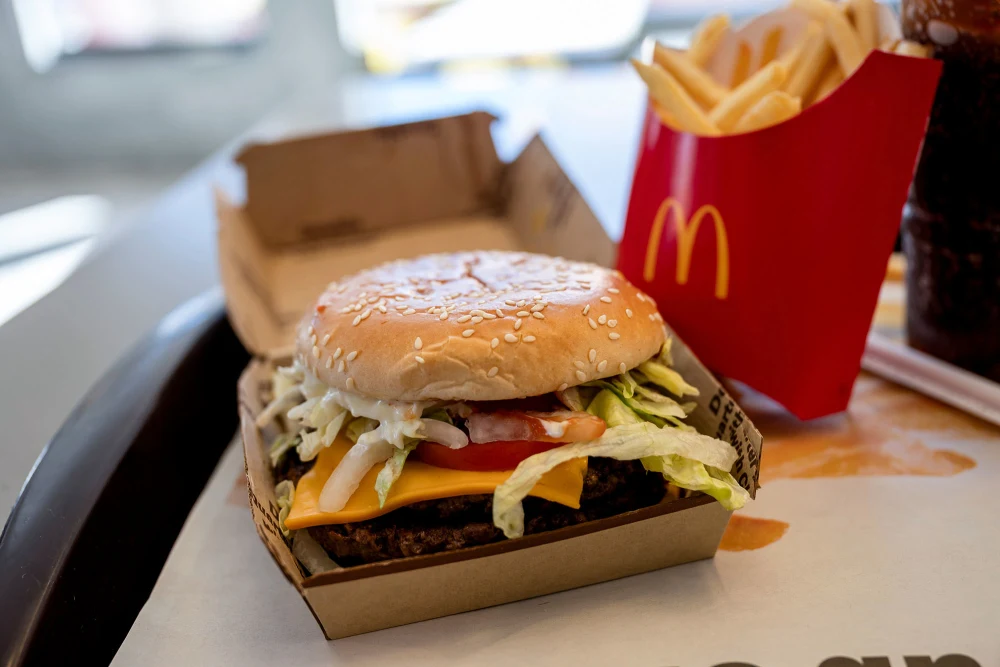Reports from the Centers for Disease Control and Prevention show how disease detectives pieced together what was making people sick.
In one of the early reports to the Centers for Disease Control and Prevention in what would later lead to a recall of McDonald’s Quarter Pounders in several states, a 61-year-old man from Wisconsin said he got sick after eating the hamburger with onions that he said he didn’t order.
“Patient reported that he ordered the Quarter Pounder without onions and was angry because it came with them on it,” according to the Oct. 21 patient report. The man ate the burger, onions included, the report said, when he was passing through a Colorado airport during a layover Sept. 29.
He later tested positive for E. coli O157:H7, a particularly nasty strain of the bacteria that can cause severe kidney problems.
In another report, a 76-year-old woman in Colorado got sick Oct. 5 and needed to be hospitalized. She reported eating an Egg McMuffin, fries and a Quarter Pounder from McDonald’s. Another day, she said, she had a ceasar salad and salmon and rice at other restaurants. She also tested positive for the E. coli strain.
And a 16-year-old boy in Colorado who reported eating at McDonald’s “most days and typically orders a Quarter Pounder or cheeseburger at each meal” got sick with E. coli O157:H7 on Sept. 29, according to his patient report. The teen said he also had a “Dr. Pepper, milk shake, bite of McChicken” at McDonald’s. Another day, a “bbq sandwich and fries” at a different restaurant.
The reports, along with 80 others, were provided to NBC News through a Freedom of Information Act request. They encompass nearly all of the reports the CDC received as it investigated a growing E. coli outbreak that the agency would eventually link to slivered onions served on McDonald’s Quarter Pounders in 14 states and connected to 104 illnesses, including one death. The CDC redacted all personal information from the reports, which were submitted to the agency by health care providers and state health officials who were investigating foodborne illness outbreaks in their own states.
The outbreak led McDonald’s to temporarily stop serving its Quarter Pounders in several states. At the same time, a Colorado onion supplier recalled its yellow onions in response to the outbreak.
On Tuesday, the CDC declared the outbreak over. No new cases have been detected since Oct. 21.
A McDonald’s spokesperson referred NBC News to a statement it published on its website Nov. 14, which said that the FDA said “there does not appear to be a continued food safety concern related to this outbreak at McDonald’s restaurants.”
Ben Chapman, a food safety specialist and head of agricultural and human sciences at North Carolina State University, said that the CDC and the FDA did “a good job” managing the McDonald’s outbreak, adding they acted “very quickly” to identify a product early and link it to the Quarter Pounders.
“They then updated the public when they identified onions as the most likely source,” he said. “I think that was very helpful and everything seemed to happen relatively quick.”
The CDC documents provided to NBC News offer a peek into the detective work as the agency’s investigators, alongside state health officials, raced to identify the cause and get the outbreak under control.
“A lot of ill people”
Matt Wise, chief of the CDC’s Outbreak Response and Prevention Branch, said Colorado health officials alerted the agency to an increase in E. coli infections in the state Oct. 10.
Those health officials, Wise said, gave the first crucial clue. “They were at that point seeing that a lot of ill people were reporting eating at McDonald’s,” he said.
That information was gleaned from interviews that state and local health officials in Colorado did with patients. “They’ll ask about foods and where people eat and stuff,” he said.
Five days later, on Oct. 15, the CDC got DNA results back from Colorado, which showed that infections were linked, Wise said. The results also confirmed that there were illnesses in other states, and the CDC opened up a multistate investigation, he said.
At that point, the CDC worked with Colorado to develop a more detailed questionnaire to distribute to suspected patients.
The questionnaire asked about the foods they remembered eating, whether their meals included ingredients such as tomatoes, pickles, lettuce or onions, and if they made any substitutions to meals ordered at restaurants. It also asked if they ate at McDonald’s and had the Quarter Pounder, with or without onions.








